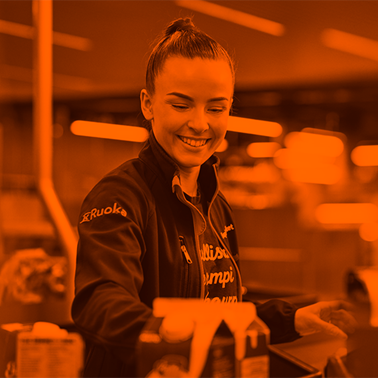

The year of the pandemic was a great year for bottle collection – customers returned 614 million cans and bottles to K-stores for recycling

In 2020, a total of around 614 million cans and bottles were returned for recycling by customers of K-food stores. The number of deposit beverage containers returned increased by almost 10 per cent on the previous year 2019, when the number of cans and bottles returned to K-food stores totalled around 562 million.
From a worldwide perspective, the Finnish deposit-based recycling system is unique, and Finland is, indeed, one of the world’s leading countries in recycling beverage containers. In October 2020, the world record for bottle collection was broken at K-Citymarket Kupittaa when a total of 33,328 cans and bottles were returned to a single machine in one day.
“The recycling rates of beverage containers are very high in Finland, as more than 90 per cent of all bottles and cans end up being recycled. Last year there was an increase in the consumption of beverages at home, which also further increased the number of beverage containers returned,” says Tommi Vihavainen, Director at Palpa.
More and more bottles are deposit bottles
Promotion of the circular economy is one of the cornerstones of K Group’s sustainability work, and recycling is an important part of this. Deposit bottles and cans provide an excellent incentive for recycling, and in recent years, an increasing number of K Group’s own brand products have been packaged in deposit bottles. For example, Pirkka squash bottles, PET bottles of fresh-squeezed juices and Pirkka Parhaat smoothie bottles are now deposit bottles.
“Recycling plays a key role in getting materials back into circulation and reused for new purposes. By adding deposits to Pirkka squash bottles, for example, we can get an extra 40 tonnes of plastic waste back into circulation,” says Timo Jäske, Vice President for Sustainability in K Group’s grocery trade division.
Returning your bottles is an easy way to help the environment
The cans and bottles that are returned are given a new life and save natural resources, as the valuable raw materials are used again. Aluminium cans, which can be recycled an almost unlimited number of times, can be directly used to make new cans, whereas colourless PET bottles can be turned into the material used to make raincoats, for example. Of the deposit PET bottles used in Finland, 93 per cent can be recycled into new bottles. Deposit bottles should be returned with their caps on so that the caps can also be recycled.
Manufacturing of recycled glass bottles and aluminium cans is also considerably more energy-efficient than the manufacturing of beverage containers using new raw material. Manufacturing a can from recycled material, for example, consumes only 5 per cent of the energy that is needed to manufacture it from a new raw material.
Returning your beverage containers is an easy way to help the environment and something that can be easily done while shopping at your own K-food store. The Tomra R1 reverse vending machines introduced at numerous K-Citymarkets make it even easier to return your beverage containers, as you can pour more than one hundred cans and PET bottles into the machine at one time.
 YES
YES
 NO
NO












